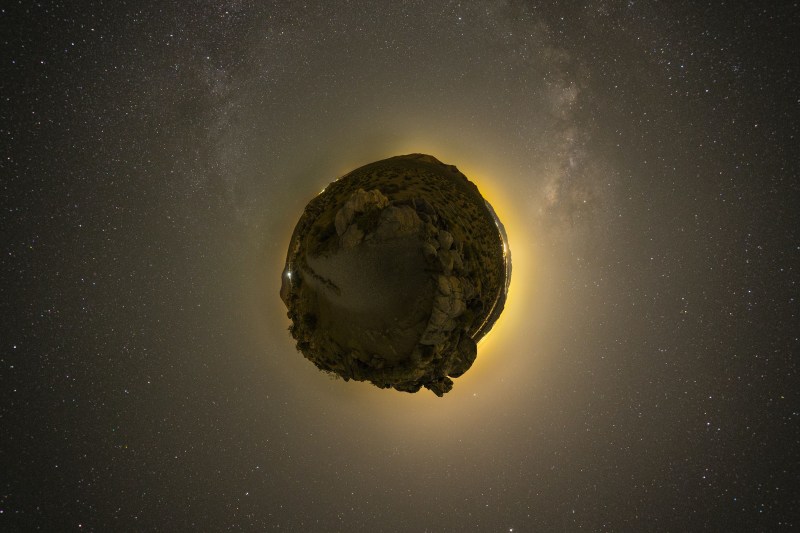You’ve seen the scenario in movies and TV shows: There’s an asteroid headed for the planet, and it’s threatening to wipe out all life on the planet. Of all the mysteries of what’s out there in space, there’s something uniquely terrifying about the prospect of a chunk of rock heading toward us fast enough to smash into Earth. Now you can enjoy a lovingly rendered video showing the destruction that might occur if such an impact were ever to happen.
Watch what would happen if an asteroid collided with Earth
A now-removed viral post on the Absolute Units subreddit shows what would happen to the planet if the largest known asteroid were to collide with the planet. Unsurprisingly, the 338-mile/545-kilometer-wide space rock would totally annihilate every living thing on Earth, destroying vast landscapes and covering the planet in smoke and fire. You can also view the full video (set to Pink Floyd’s “The Great Gig in the Sky.”)
Massive destruction
An asteroid hitting Earth is called an impact event. And while these are rare, the effects of one would be massively damaging to all life on the planet—and the asteroid wouldn’t need to be 338 miles across to do so. Even smaller asteroids can cause incredible destruction.
An asteroid that’s about the same size as a 20-story building, or around 200 feet long, would produce the same amount of energy as the largest nuclear bomb ever created (25 to 50 megatons). A one-mile-wide asteroid on a collision course with Earth would hit the planet at around 30,000 miles per hour. An asteroid of this magnitude has roughly the same amount of energy as a one-million-megaton bomb.
Scientists believe that an asteroid would need to be approximately seven to eight miles wide for an impact event to wipe out most life on Earth. If this size asteroid impacts Earth, an enormous plume of dust would envelop the planet, blocking the sun and raising temperatures near the point of impact. For an asteroid to completely wipe out all life on the planet, it would need to be around 60 miles wide.

How likely is an impact event?
The chances of an asteroid hitting Earth are minimal, and previous impact events have been rare. In the 20th and 21st centuries combined, there were a total of 18 observed instances of asteroids hitting the earth. It’s believed that there may have been more that were too small or were simply unobserved.
According to The Planetary Society, the odds of an impact event by asteroid size are:
- Larger than 3 meters: around once a year
- Larger than 30 meters: once every 100 years
- Larger than 140 meters: one in 100 chance every 100 years
- Larger than 1,000 meters: one in 50,000 chance every 100 years
An asteroid hitting Earth rarely occurs outside of sci-fi movies. Smaller asteroids are more common and typically cause minimal damage. But, if we are unlucky enough to be hit by a massive asteroid—whether 60 miles wide or 338—all life as we know it would be completely obliterated.
How could an asteroid impact be prevented?
The question of what would happen if an asteroid hit the planet isn’t only of interest to Hollywood or to the general public. Space agencies like NASA have been increasingly interested in protecting Earth from asteroids in the last decade or so, in a growing field called planetary defense. There are two aspects required to prevent a huge asteroid impact: First, spotting the asteroids before they hit, and second, finding some way to deflect or destroy them.
For the first job, spotting asteroids requires a lot of eyes on the sky. Asteroids are tricky to spot compared to objects like stars because they move so fast, streaking across the sky in quick bursts. However, there are projects dedicated to spotting asteroids and particularly looking for those which might one day threaten Earth, called Potentially Hazardous Objects (PHOs).
Space-based telescopes like NASA’s NEOWISE were used to spot incoming asteroids, as well as many telescopes on the ground. NEOWISE is set to come to an end shortly as the spacecraft will burn up in the planet’s atmosphere, but it will soon be replaced by a successor called NEO Surveyor which will be even more powerful at detecting these objects. Upcoming ground-based telescopes like the Vera Rubin Observatory will also able to detect millions of objects in our solar system, including asteroids which may be approaching Earth.
Once an asteroid has been spotted, there’s even a chance we may be able to deflect it. A NASA mission called DART or Double Asteroid Redirection Test was a spacecraft deliberately designed to crash into an asteroid called Dimorphos to test out planetary defense possibilities. DART impacted the asteroid in 2022, and it was successful in changing that asteroid’s orbit.
Asteroid Dimorphos wasn’t really a danger to Earth, but the test showed that the seemingly crazy idea of crashing a spacecraft into an asteroid to nudge it away from Earth works, at least in principle. The challenge in applying that is that the asteroid Dimorphos was extremely small, so the DART spacecraft only had to impact it with a relatively small amount of force to nudge it. A real asteroid big enough to threaten Earth would need a much larger spacecraft to knock it off course. And there’s the matter of timing. Any anti-asteroid spacecraft would need to be built, launched, and intercept an asteroid in the time before it arrived at Earth to have a hope of deflecting it.
So there’s no definite defense against asteroids — yet. But there could be in the future.



